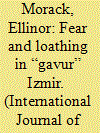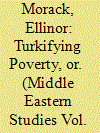| Srl | Item |
| 1 |
ID:
152356


|
|
|
|
|
| Summary/Abstract |
Based on a series of recollections published between January and April 1926 in the Izmir-based daily newspaper Ahenk (Harmony), this article explores how individual Muslim Turks remembered their emotional responses to the Greek occupation of that city (May 1919–September 1922). Analyzing these recollections, it considers why certain events were remembered while others were almost completely left out. By studying how Muslim Turks described their feelings towards the occupying forces, local non-Muslims, and the eventually victorious Turkish army, the article makes an initial contribution to the history of emotions in early republican Turkey. I argue that the composition and consumption of memories were avenues for connecting emotionally to the Turkish nationalist project. This finding challenges the widespread notion that the early republican period was characterized by collective amnesia of the immediate past, and contributes to the growing body of scholarship on popular participation in early republican nationalism.
|
|
|
|
|
|
|
|
|
|
|
|
|
|
|
|
| 2 |
ID:
164901


|
|
|
|
|
| Summary/Abstract |
This article shows that ‘Turkification’, a term widely used by historians of modern Turkey to refer to the forced transfer of property from Christian into Muslim hands, ought to be conceptualized not only in the sense of ‘enrichment’ but also, with regard to the working classes, as a process in which Muslim people inherited the poverty of their Christian predecessors. Taking İzmir as a case in point, the article first describes the plight of the overwhelmingly Christian working class prior to 1922. It then studies reports and editorials that discussed the economic and social situation in İzmir in the years 1923 to 1926, after the Turkish victory and forced migration of her Christian population. Over the course of these years, İzmir experienced a serious economic crisis, and bread prices reached levels that led to widespread undernourishment and hunger among the cityʼs poor. Agricultural production was lagging behind pre-war levels, and positive effects of ‘Turkificationʼ policies were failing to materialize. By analyzing the contemporary journalistsʼ attempts at explaining the crisis, but also pointing out national and transnational factors that they were probably unaware of, the article makes an original contribution to the economic and social history of early republican Turkey.
|
|
|
|
|
|
|
|
|
|
|
|
|
|
|
|